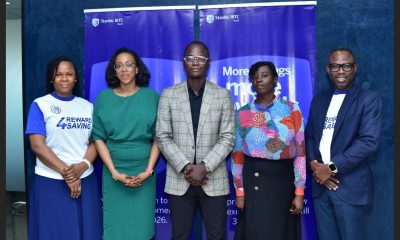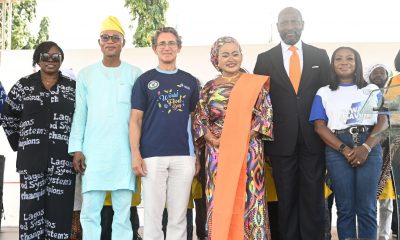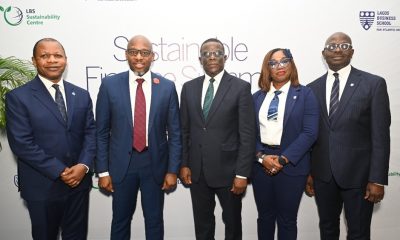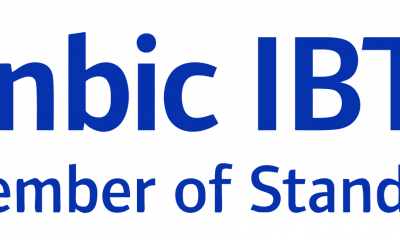Banking
Stanbic IBTC Bank Deploys Robots for Banking Operations
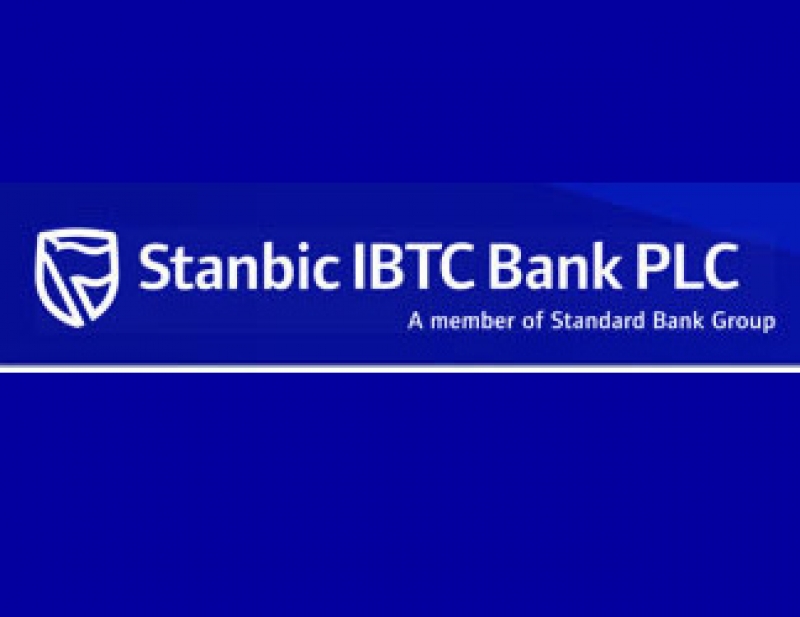
By Dipo Olowookere
Robots called BlueBots have been deployed to some branches of Stanbic IBTC Bank to perform different banking activities.
This is the first time a financial institution in the country was making use of robots to carry out key banking operations to serve customers better.
A statement issued by Stanbic IBTC Bank, a member of Stanbic IBTC Holdings Plc, explained that this was another bold step taken towards service efficiency and enhanced customer experience.
Deployed about three months ago, the Stanbic IBTC BlueBots manage middle and back office activities. At the operational centre at Ilupeju, Lagos, the robots facilitate Account Origination and Servicing for Anti-Money Laundering (AML) transactions and Processing and Clearing for inward cheque confirmation.
At the Idejo, Lagos office, the Credit Risk Management System robots handle Personal Banking Credit assessments while at the bank’s headquarters in Lagos, the robots are deployed in Global Market Operations (GMO) to manage T-Bills processing.
The development heightens the growing application of artificial intelligence by the bank with the earlier deployment of the Stanbic IBTC Bank Chatbot, christened Sami, an artificial intelligence-powered conversational and transactional channel for rendering banking services to customers.
Speaking in Lagos, Chief Executive, Stanbic IBTC Bank, Dr Demola Sogunle, said given the rapid manner technology is evolving and the disruption this can trigger, it is imperative to tap into such evolving trends and technology to address the changing needs of customers.
“The Stanbic IBTC robot deployment speaks to our determination to consistently apply innovation and technology to provide bespoke financial solutions to our clients. The special features of the Stanbic IBTC BlueBots ensure that our customers are availed seamless banking solutions consistently and conveniently,” Mr Sogunle said.
He added that the robots were designed and deployed to reduce manual intervention, eliminate errors and reduce cost of processing in reconciliation processes, with reconciliation turnaround time reduced significantly and it was delivered at zero cost which is a first in the Nigerian Banking industry.
“We wanted something new. We wanted to increase speed. We wanted to boost efficiency and accuracy. Constantly raising the bar is a key value for us at Stanbic IBTC and leading the implementation of all the possible applications of Artificial Intelligence (AI) in Nigeria was a good way to raise the bar,” Mr Sogunle added.
Elaborating further, Manager, Business Transformation Programmes, Stanbic IBTC Bank, Mr Wole Adesiyan, attributed the deployments to the ingenuity and creativity of Stanbic IBTC personnel as the feat was a strictly in-house project with support from Standard Bank South Africa, parent company of the Stanbic IBTC Group.
He described Stanbic IBTC as the Bank of the Future that will deploy every relevant technology to stay ahead of the curve. “We believe in preparing for the future without ignoring our environment and the culture of our people. Here in Nigeria, the average individual still desires human interaction when dealing with anything as sensitive as money.
“Maintaining a hybrid bank structure will keep us ahead of the curve. Through learning and development, we are prepared for a future that includes Artificial Intelligence and Robotics Process Automation. If a machine can do your job, prepare for a better one,” he said.
Mr Adesiyan said the robots are equipped with sophisticated security features to ensure round-the-clock performance without breaches. “We pride ourselves on the high level security that is provided by our in-house teams to the applications and solutions developed and deployed.”
As a member of the Standard Bank Group, Africa’s largest bank by assets and earnings, Mr Adesiyan said Stanbic IBTC will continue to leverage on the 155-year experience, expertise and strong financial clout of the mother brand to deliver superior sustainable shareholder value by meeting the needs of its clientele.
Only last week, Stanbic IBTC Bank was adjudged the Best Digital Bank in Nigeria in the Agusto & Co 2018 Consumer Digital Banking Satisfaction Index report, which Mr Adesiyan said is a standard that has been set and made it imperative to constantly raise the bar in providing customer satisfaction, digitally or otherwise.
He added that a similar quest prompted Stanbic IBTC Bank to launch, in November 2015, a personal teller machine (PTM), which offers customers the benefits of both self-service video banking and branch teller experience combined in one solution. The PTM combines video banking and remote transaction processing banking technology embedded within the machine to give customers the choice of self-service or connecting with a remote teller in a highly personalized, two-way audio/video interaction.
Banking
Public Offer: Sterling Holdco Allots 13.812 billion Shares to 18,276 Shareholders

By Aduragbemi Omiyale
Sterling Financial Holdings Company Plc has allotted shares from its public offer of 2025 to investors with valid applications.
The allotment follows the earlier receipt of final approval from the Central Bank of Nigeria (CBN) and the recent clearance by the Securities and Exchange Commission (SEC).
In September 2025, the financial institution offered for sale about 12,581,000,000 ordinary shares of 50 kobo each at N7.00 per share in public offer.
However, the exercise received wide participation from the investing public, with the company getting 18,280 applications for 16,839,524,401 ordinary shares valued at approximately N117.88 billion.
Following a thorough verification process, valid applications were received from 18,276 shareholders for a total of 13,812,239,000 ordinary shares, representing a subscription level of 109.79 per cent and reflecting sustained confidence in Sterling Holdco’s strategic direction, governance, and long-term growth prospects.
The firm approached the capital market for additional funds for the recapitalisation of its two flagship subsidiaries, Sterling Bank and The Alternative Bank.
The capital injection will support the commencement of full operations and contribute to the group’s revenue diversification objectives.
In line with the guidelines set out in the offer prospectus, Sterling Holdco confirmed that all valid applications will be allotted in full. Every investor who complied with the terms of the offer will receive all the shares for which they applied.
A very small number of applications were not processed or were partially rejected due to non-compliance with the offer terms, including duplicate payments and failure to meet the minimum subscription requirement of 1,000 units or its multiples, as stipulated in the offer documents.
The group ensures a seamless post-offer process, with refunds for excess or rejected applications, along with applicable interest, to be remitted via Real Time Gross Settlement or NIBSS Electronic Funds Transfer directly to the bank accounts detailed in the application forms.
Simultaneously, the electronic allotment of shares has be credited to successful shareholders’ accounts with the Central Securities Clearing System (CSCS) on February 17, and for applicants who do not currently have CSCS accounts, their allotted shares will be temporarily held in a registrar-managed pool account pending the submission of their completed account opening documentation to Pace Registrars Limited, after which the shares will be transferred to their personal CSCS accounts.
Banking
CBN Governor Seeks Coordinated Digital Payment Reforms

By Modupe Gbadeyanka
To drive inclusive growth, strengthen financial stability, and deepen global financial integration across developing economies, there must be coordinated reforms in digital cross-border payments.
This was the submission of the Governor of the Central Bank of Nigeria (CBN), Mr Olayemi Cardoso, at the G‑24 Technical Group Meetings in Abuja on Thursday, February 19, 2026.
According to him, high remittance costs, settlement delays, fragmented systems, and heavy compliance burdens still limit the participation of households and Micro, Small and Medium Enterprises (MSMEs) in global trade.
The central banker emphasised that efficient payment systems are essential for economic inclusion, highlighting that global remittance corridors still incur average costs above 6 per cent, with settlement delays of several days, excluding millions from modern economic activity.
Mr Cardoso cautioned that while digital payments present significant opportunities, they also carry risks such as currency substitution, weakened monetary transmission, increased FX volatility, capital-flow pressures, and regulatory fragmentation.
The G-24 TGM 2026, themed Mobilising finance for sustainable, inclusive, and job-rich transformation, convened global financial stakeholders to advance the modernisation of finance in support of emerging and developing economies.
The CBN chief reaffirmed Nigeria’s commitment to working with G-24 members, the IMF, the World Bank Group, and other partners to build a more inclusive, resilient, and development-oriented global financial architecture.
“We have strengthened our AML/CFT frameworks in line with FATF guidelines, requiring strict dual-screening of cross-border transactions to mitigate risks.
“To deepen regional integration, the CBN introduced simplified KYC/AML requirements for low-value cross-border transactions to encourage broader participation in PAPSS, easing processes for Nigerian SMEs and enabling faster intra-African trade payments.
“We have also embraced fintech innovation through our Regulatory Sandbox, allowing payment-focused fintechs to test secure, instant cross-border solutions under close CBN supervision,” he disclosed.

Banking
Unity Bank, Providus Bank Merger Awaits Final Court Approval

By Modupe Gbadeyanka
The merger and business combination between Unity Bank Plc and Providus Bank Limited remains firmly on course, a statement from one of the parties disclosed.
According to Unity Bank, there is no iota of truth in reports in certain sections of the media suggesting that the merger process had stalled, as the transaction remains firmly on track.
It was disclosed that the necessary regulatory steps have been completed, but only a few other steps to finalise the transaction, especially the final court sanction.
There had been speculations that both lenders may not meet the new minimum capital requirement of the Central Bank of Nigeria (CBN) before the March 31, 2026, deadline.
However, it was noted that the combined capital base of Unity Bank and Providus Bank exceeds N200 billion, which is the minimum requirement to retain a national banking licence under the CBN’s recapitalisation framework.
When completed, the Unity-Providus merger is expected to deliver a stronger, more competitive, and customer-centric financial institution — one with the scale, innovation, and reach to redefine the retail and SME banking landscape in Nigeria.
“The merger with Providus Bank significantly enhances our capital base, operational capacity, and strategic positioning.
“We are confident that the combined institution will be better equipped to support economic growth and deliver innovative financial solutions across Nigeria,” the chief executive of Unity Bank, Mr Ebenezer Kolawole, stated.
Recall that a few months ago, shareholders authorised the merger between the two entities at Court-Ordered Meetings. They also adopted the scheme of merger at their respective Extraordinary General Meetings (EGMs) in September 2025,
The central bank also backed the merger, with a pivotal financial accommodation to support the transaction. The merger also received a further boost with a “no objection” nod from the Securities and Exchange Commission (SEC).
The regulatory approvals form part of broader efforts to strengthen the resilience of Nigeria’s banking system, reinforce capital adequacy across the sector, and mitigate potential systemic risks.
The development positions the combined entity among the 21 banks that have satisfied the apex bank’s new capital threshold for national banking operations.
-

 Feature/OPED6 years ago
Feature/OPED6 years agoDavos was Different this year
-
Travel/Tourism10 years ago
Lagos Seals Western Lodge Hotel In Ikorodu
-

 Showbiz3 years ago
Showbiz3 years agoEstranged Lover Releases Videos of Empress Njamah Bathing
-

 Banking8 years ago
Banking8 years agoSort Codes of GTBank Branches in Nigeria
-

 Economy3 years ago
Economy3 years agoSubsidy Removal: CNG at N130 Per Litre Cheaper Than Petrol—IPMAN
-

 Banking3 years ago
Banking3 years agoSort Codes of UBA Branches in Nigeria
-

 Banking3 years ago
Banking3 years agoFirst Bank Announces Planned Downtime
-

 Sports3 years ago
Sports3 years agoHighest Paid Nigerian Footballer – How Much Do Nigerian Footballers Earn


